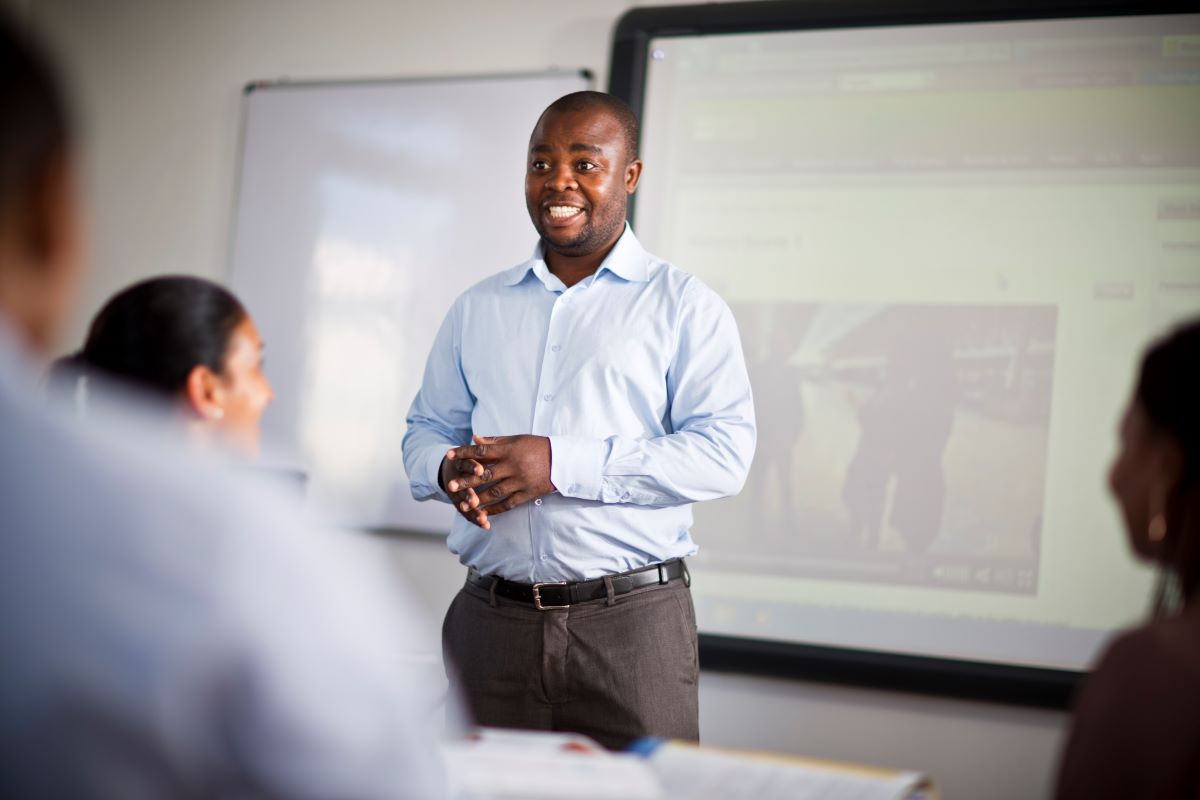
What's happening in October 2023?
Whether you are a teacher or a teacher educator, this page gives you an overview of all the activity happening across our TeachingEnglish channels in October 2023.
For teachers this month, we'll be focusing on the theme of 'Taking responsibility for professional development'. For teacher educators, the focus is 'Supporting ongoing teacher professional development'. If you're interested in these themes, see below for information about:
- Current and upcoming free online training courses
- Upcoming online events and webinars for teachers and teacher educators
- Facebook and Instagram Live events
- Podcasts
- Current research and insights
In addition to our monthly themed events and content, we also have hundreds of lesson plans and classroom resources. Below we've selected some lesson plans connected to United Nations special days this month.
 Online training courses
Online training courses
Our tutored course for the month is 'Focus on professional development'. Live events and discussions related to this course are hosted in our Courses for teachers community on Facebook. Find out about 'Focus on professional development' and all other courses open in October below.
- Focus on professional development
-
Take control of your professional development by exploring a range of developmental activities available to teachers and how to take advantage of them through collaboration and reflective practice.
In this free 4-week online course, you will learn about the following:
-Understanding professional development
-Engaging with reflective practice
-Engaging with peer observation
Find out more and enrol on this free course - Creative resources for primary
-
Inspire your primary learners by learning how to make high-quality resources out of creative and sustainable teaching materials. Develop your learners’ language and oral skills through effective use of resources such as flashcards, big books, and puppets.
In this free online course, you will learn about the following:
-Understanding flashcards for primary
-Understanding picture books for primary
-Understanding puppets and masks for primary
Find out more and enrol on this free course - How to teach vocabulary
-
Help your learners notice, record, recycle and use new vocabulary more confidently with engaging, classroom activities.
In this free online course, you will learn about the following:
-Understanding vocabulary
-Engaging with vocabulary - recording and recycling
-Engaging with vocabulary teaching
Find out more and enrol on this free course - How to teach listening
-
Develop your understanding of speaking skills and explore teaching techniques and activities which promote oral communication in the classroom for a range of ages and levels.
In this free online course, you will learn about the following:
-Understanding listening skills
-Engaging with listening - active listening
-Engaging with listening - strategies
Find out more and enrol on this free course
 Online events and webinars
Online events and webinars
See our free online events and webinars for teachers and teacher educators below.
- World Teachers' Day (5 October)
-
This is the first day of our three-day webinar event to celebrate World Teacher's Day 2023. On Thursday 5 October you can attend up to six webinars by ELT teachers and experts from around the world. Webinars will take place from 09:00 to 12:30 (UK time) and 15:00 to 18:30 (UK time). The webinars are for teachers of primary, secondary and young adult English language learners.
Schedule and speakers
9.00 UK - 10.00am UK: Bringing acting to class: the role of role-plays (Kris Kirby - Hong Kong)
10.15 UK - 11.15 UK: Teaching not testing: spelling with spelling journals (Olena Gyrch - Qatar)
11.30 UK - 12.30 UK: Creating your own learning materials - six easy steps (Nenad Miladinović - Serbia)
15.00 UK - 16.00 UK: Encouraging learning through speaking (Sheona Smith - Spain)
16.15 UK - 17.15 UK: Increasing student autonomy inside and outside the classroom (Jorge Chacon - Venezuela)
17.30 UK - 18.30 UK: Fostering real-world learning through inquiry-based learning (Michelle Worgan - Spain)
Thursday 5 October 2023 09.00 - 18.30 (UK time).
Find out more and register for this online event. - World Teachers' Day (6 October)
-
This is the second day of our three-day webinar event to celebrate World Teacher's Day 2023. On Friday 6 October you can attend up to six webinars by ELT teachers and experts from around the world. Webinars will take place from 09:00 to 12:30 (UK time) and 15:00 to 18:30 (UK time). The webinars are for teachers of primary, secondary and young adult English language learners.
Schedule and speakers
9.00 UK - 10.00am UK: Bending the rules: developing learner awareness of how language really works (Andy Keedwell - UK)
10.15 UK - 11.15 UK: Professional development is as easy as ABC (Abeer Okaz - Egypt)
11.30 UK - 12.30 UK: Integrating social-emotional learning (SEL) framework in K-12 English lessons to promote 21st-century learners' profile (Fatiha Najma - Indonesia)
15.00 UK - 16.00 UK: Get the party started: Teaching lower-level teens and adults (Rhona Snelling - UK)
16.15 UK - 17.15 UK: Overcoming challenges of active and passive learning and teaching (Nkumbe Sandrine Epole - Cameroon)
17.30 UK - 18.30 UK: Music's ability to uplift and calm...and how it can be harnessed in the language teaching classroom (Chris Walklett - UK)
Friday 6 October 2023 09.00 - 18.30 (UK time).
Find out more and register for this online event. - World Teachers' Day (7 October)
-
This is the last day of our three-day webinar event to celebrate World Teacher's Day 2023. On Saturday 7 October you can attend up to five webinars by ELT teachers and experts from around the world. Webinars will take place from 10:00 to 16:00 (UK time). The webinars are for teachers of primary, secondary and young adult English language learners.
Schedule and speakers
10.00 UK - 11.00am UK: Promoting well-being in the primary EFL classroom (Jane Ritter - Italy)
11.15 UK - 12.15 UK: Effective stage transitions for better student engagement (Ashlesha Rodrigues Dsouza - India)
12.30 UK - 13.30 UK: All together in reflective practice (Patricia Ramos Vizoso & Ula Staszczyk - Spain)
13.45 UK - 14.45 UK: Using video-based observations for self-directed development (Cecilia Nobre - UK)
15.00 UK - 16.00 UK: Planning lessons for the 21st century learner (Hafsah Aminu and Rasheedat Sadiq - Nigeria)
Saturday 7 October 2023 10.00 - 16.00 (UK time).
Find out more and register for this online event. - World Teachers' Day for teacher educators (7 October)
-
Join us on Saturday 7 October for this special World Teachers' Day event for existing and aspiring teacher educators. If you’re already a teacher educator with a formal role supporting the professional development of teachers or you’re a teacher who’d like to find out more about becoming a teacher educator, or you’d simply like to know about how you can help other teachers who are just starting out then register for the teacher educator strand of the events the British Council is organising for World Teachers Day.
Schedule and speakers
9.00 UK - 9.15am UK: Introduction and teacher educator roles (John Shackleton - UK)
9.15 UK - 10.00 UK: Career and learning paths (Sirin Soyoz - Turkey)
10.15 UK - 11.00 UK: Example professional development opportunities (Mai Nguyen - UK and Charles Motanya - Nigeria)
11.15 UK - 11.45 UK: Training room ideas and upcoming teacher educator MOOC (Karen Waterston - Spain)
11.45 UK - 12.00 UK: Key principles of planning CPD for teachers (John Shackleton - UK)
Saturday 7 October 2023 9.00 - 12.00 (UK time).
Find out more and register for this online event. - Observing teachers to support their professional development (10 October)
-
Please note the content of this webinar is not aimed at teachers, and is specifically for teacher educators who have a role in supporting the professional development of English language teachers.
Classroom observation is a useful tool for professional development. However, there are a number of challenges in ensuring that observations are effective for this purpose and not seen as solely a means to evaluate teacher performance. Observation can be done in a variety of ways, including by using technology in some innovative ways. In this session, Amy Lightfoot will outline some approaches to observation recently used in Rwanda and Nepal, challenges that were faced and potential solutions. The webinar will enable reflection on whether similar methods could be used in your context.
Tuesday 10 October 2023 12.00 - 13.00 (UK time).
Find out more and register for this online event. - Facebook and Instagram Live events in October 2023
-
Join our online community of more than 4 million teachers worldwide. We will be hosting weekly events throughout October via our Facebook and Instagram channels.
These 30-minute 'live' sessions are a great opportunity for you to join teachers from around the world.
Engage with English language teaching experts and community members on a range of topics and themes to help you develop your teaching skills, and share ideas and questions with a vibrant global online community.
See what's happening in our community on Facebook
See what's happening in our community on Instagram
 For the classroom
For the classroom
See a selection of lesson plans below that you can use to focus on United Nation Special Days in October in your language teaching classrooms.
- International Day of Older Persons (1 October)
-
Title of lesson plan: My grandfriend
Age group: Primary
Level: A1
In this lesson students listen as the teacher describes the lives of three Grandfriends, choosing the pictures which correspond to each person. They use the information to invent a Grandfriend, or to describe a Grandparent or an older person they know. There are two versions of this lesson - one designed for use in face-to-face classrooms, and another to be used in online and remote teaching contexts.Title of lesson plan: Getting old
Age group: Secondary and adults
Level: Intermediate and above
There is a discussion about getting old and a roleplay where students take on the roles of people of diverse ages. Students will also read a poem about getting old and discuss the idea of living forever. - World Space Week (4 October)
-
Title of lesson plan: The moon and the stars
Age group: Primary
Level: A1 and above
This is a topic which allows children to explore their imagination through poems, crafts and creative activities. Most children are fascinated with this topic because it simultaneously teaches them about the real world around them and allows them to explore their imagination. It can be as long or as short as you wish, depending on the age you teach and the time you have available.Title of lesson plan: Space – the sun, moon, stars and planets
Age group: Primary
Level: A1 and above
In this lesson, children play a game using vocabulary about space, sing a song about travelling to the sun, listen to and read a story about a fictional planet, design their own story with support from a structured template and then write about it.Title of lesson plan: Space
Age group: Primary
Level: A1 and above
In this lesson, learners will look at the planets in the solar system and features of planets. They will listen to and sing a song, then watch a story about features of different planets. They will practise describing planets using 'there is/are', and then work together to invent their own planet. Finally learners can play a game to learn or review vocabulary.Title of lesson plan: International Day of Human Space Flight
Age group: Primary
Level: A1 and above
In this lesson, learners find out some key facts and figures related to space exploration. The information is presented in a fun way through a pair work jigsaw reading activity in which pupils practise both question forms and saying numbers. Afterwards they work in groups, using the information they have learnt to make classroom posters celebrating human achievements in space. - World Teachers' Day (5 October)
-
See https://www.teachingenglish.org.uk/news-and-events/world-teachers-day for information about the events on TeachingEnglish for World Teachers' Day.
- World Mental Health Day (10 October)
-
Title of lesson plan: Are you active or not?
Age group: Primary
Level: A2 and above
This lesson plan is based on an activity from the British Council publication Integrating global issues in the creative English language classroom, which provides innovative ideas for teaching while raising awareness of the United Nations Sustainable Development Goals. In this lesson, which supports Goal 3: Good health and well-being, learners take part in a short exercise routine and classify activities according to their intensity. They think about the importance of doing physical activity and plan their own short routine which they lead for their group. Then they think about how much activity they need to do and how much they actually do with a simple quiz. Finally, they make a daily exercise chart for themselves which they can try to follow outside of class. - World Food Day (16 October)
-
Title of lesson plan: World food day
Age group: Older primary or secondary
Level: A2 and above
In this lesson, instead of focusing on the topic of food itself, learners learn about the problem of hunger in the world and the need to work together to eradicate it. Learners start by reading a text about World Food Day that contains some statistics about hunger. They answer a series of questions related to the text, designed to make them think critically about issues related to hunger. They share their ideas about what they can do to raise awareness in their community. Finally they collaborate to write letters to world leaders, explaining how they feel and why this issue is important.Title of lesson plan: My healthy lunch
Age group: Primary
Level: A2 and above
In this lesson children draw a lunch setting and then play a dice game to decide what to eat from a selection of foods, which include many healthy choices. This game can be played as part of World Food Day, which is celebrated on 16 October each year, or whenever you cover the topic of food with your young learners.Title of lesson plan: Food issues
Age group: Secondary
Level: B1 and above
Use this lesson in online or face-to-face teaching to focus on a variety of food-related issues. The face-to-face lesson plan looks at two food-related topics: School dinners and Britain's snack culture. The online lesson looks exclusively at Britain's snack culture.Title of lesson plan: Green fingers
Age group: Secondary and adults
Level: B1 and above
This lesson offers a variety of activities based on growing or gathering your own food. Students will do a picture dictation to review vocabulary, read a text about different types of gardening and compare their opinions on these and then take part in a role play and decide who deserves an allotment. Students will also practise speaking skills in a discussion activity.Title of lesson plan: The cooking test
Age group: Secondary and adults
Level: A2 and above
This fun writing and speaking activity helps learners practise food and cooking-related vocabulary as well as instructions.Title of lesson plan: Cooking in Britain today
Age group: Secondary and adults
Level: B1 and above
This lesson plan for teachers of teenage and adult students at intermediate level is about food and cooking. Students will take part in a discussion about their own preferences and attitudes towards food and restaurants. - International Day for the Eradication of Poverty (17 October)
-
Title of lesson plan: Ending poverty
Age group: Primary
Level: B1 and above
This lesson plan is based on an activity from the British Council publication Integrating global issues in the creative English language classroom, which provides innovative ideas for teaching while raising awareness of the United Nations Sustainable Development Goals. In this lesson, which supports Goal 1: No poverty, learners look at images contrasting wealth and poverty and think about what it means to be rich, poor or to have enough. They consider non-material needs, such as access to education and services, as well as material needs, then they make their own decisions in groups about what they think would be fair for everybody to have, using language for agreeing and disagreeing. Finally, they work together to create a poster with their ideas.Title of lesson plan: What is enough?
Age group: Secondary
Level: B1 and above
Use this lesson in face-to-face or online lessons with your teenage learners to discuss the concept of poverty. This lesson plan is adapted from the British Council publication Integrating global issues in the creative English language classroom, which offers classroom activities that focus on the United Nations 17 Sustainable Development Goals (SDGs). This lesson plan focuses on Goal 1: Ending poverty, and is based on an activity from chapter 2 of the publication. In it, students will focus on key vocabulary around the topic of poverty, discuss statistics around global poverty, discuss the meaning of wealth and well-being and consider what they need to live a poverty-free life. Finally, the students will produce a poster and present their ideas. - World Cities Day (31 October)
-
Title of lesson plan: Supporting city openness
Age group: Secondary and adult
Level: B1 and above
This is a listening activity aimed at intermediate level adult and young adult students. It explores the ways cities can attract and help with the integration of migrants into the local culture and society. The activity is based on themes and text from the OPENCities project
 Podcast episodes
Podcast episodes
See all our podcast episodes connected to October's themes below.
- Teaching English podcast: How can peer-led training and mentoring support teachers' development?
-
Teacher professional development is a crucial part of being a good teacher. However, we often think that ‘good training’ can only be obtained from ‘expert trainers’ at large conferences or through online workshops. And whilst these can definitely be hugely beneficial, many teachers forget that there is so much that they can learn from their own colleagues in their own contexts. In our interview, we hear from the EVE programme, a ground-breaking initiative which promotes gender equity in ELT conferences. After this, we journey to Romania, to hear from a very active group based in the town of Sibiu who promote peer-led teacher development workshops.
Listen to the episode and download the show notes - Teaching English podcast: How can my colleagues and I support each other?
-
When working in a busy and stressful educational environment, it’s important that teachers support and help each other as much as possible. In this episode, we hear from several teacher networks around the world about how they support their members, the projects they are doing, and the impact which they are having. Following this, we speak to Pauline Blake-Johnston, who has a wide range of experience in participating in and managing teacher networks. Her experience ranges from being the chair of NATECLA Scotland (the National Association for Teaching English and other Community Languages to Adults), to vice-chair of the Glasgow ESOL forum, to being a board member for IATEFL’S ESOL special interest group.
Listen to the episode and download the show notes
 Publications, research, and insight
Publications, research, and insight
See all of our publications related to October's themes below.
- Taking responsibility for professional development self-study booklet
-
This self-study guide for teachers and teacher educators looks at taking responsibility for professional development. It forms part of a series of self-study booklets, in which teachers will find useful theory and practice for teaching English effectively, including short case studies and professional development activities to do individually and with colleagues.
Taking responsibility for professional development self-study booklet - A handbook for exploratory action research
-
This is a practical handbook, written in a non-academic, teacher-friendly style, to show teachers how they can engage in research. The handbook takes teachers through the steps of exploratory action research, an approach to teacher-research for professional development created originally in the context of the British Council Champion Teachers programme for secondary school teachers in Chile and, since then, adopted also in teacher-research schemes in India, Nepal and Peru.
A handbook for exploratory action research - Evaluating the role of video in supporting reflection beyond INSET
-
The research considers the impact of a video-based initiative aimed at sustaining engagement, reflection and impact beyond a three-week INSET (in-service teacher education and training) programme. Teachers worked with mentors on a one to one basis in a process of reflecting on their own videos and clips from other teachers. The study uses interviews, recordings and transcripts of video-based talk to evaluate the design of this video-led mentor CPD (continuing professional development) intervention and to evaluate the nature of video-based reflection in this process.
Evaluating the role of video in supporting reflection beyond INSET - Champion Teachers Mexico: Stories of Exploratory Action Research in Escuelas Normales
-
The Champion Teachers program is an initiative of the British Council to help teachers improve their skills through continuous professional development (CPD) in research. The goal of the program is to promote specific research skills in order to understand students' academic needs, identify solutions, and implement changes supported by informed decisions. This book is the result of twelve months of hard work by a group of teacher educators (Formadores de Inglés) from Mexico. For the first time in Mexico, teacher trainers from 'escuelas normales' of the Ministry of Public Education have undergone Exploratory Action Research (EAR) under the guidance of experts in the field and have systematically reported their findings for this publication.
Champion Teachers Mexico: Stories of Exploratory Action Research in Escuelas Normales - Developing expertise through experience
-
This book collects teachers' narratives and reveals the value of reflecting on experience. Edited by Alan Maley, the book is focusing on the role of experience in teacher training and life-long development, it is an exploration and extension of Prabhu’s concept of ‘the teacher’s sense of plausibility’. Prabhu suggests that whatever forms of training and professional development teachers are exposed to, they will make sense of them in their own way, drawing on their own values, beliefs and experiences and their evolving sense of what will be appropriate for them in their specific context.
Developing expertise through experience - SETTVEO: Evidence-based reflection and teacher development
-
This study reports on the use of technology-enhanced learning in a CPD (continuing professional development) context. The aim of the study was to provide English language teachers with appropriate tools and procedures to enable them to reflect on and improve their practice through the use of the SETTVEO app. By using the app and engaging in dialogic reflection, participants were able to develop enhanced classroom interactional competence (CIC; Walsh, 2013). Findings suggest that the use of data-led self-observation, accompanied by dialogue, can promote up-close and detailed understandings of teaching and learning.
SETTVEO: Evidence-based reflection and teacher development